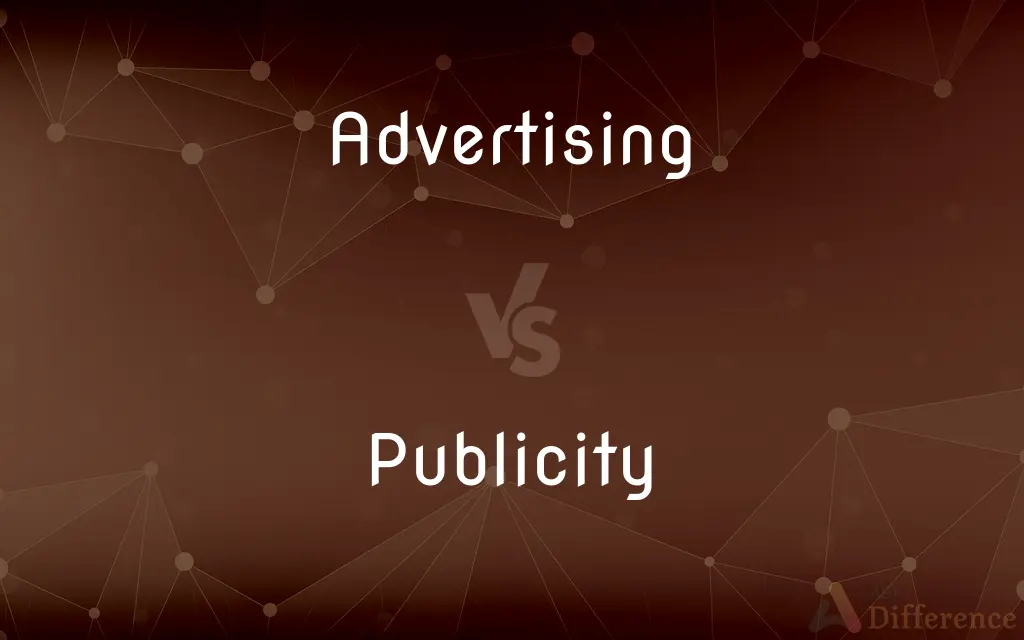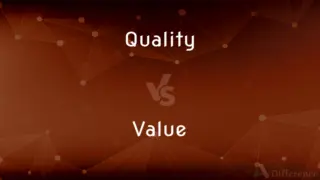Advertising vs. Publicity — What's the Difference?
By Fiza Rafique & Maham Liaqat — Updated on March 25, 2024
Advertising is a paid form of communication aimed at promoting or selling a product or service, while publicity is the unpaid spread of information that increases awareness about a subject.

Difference Between Advertising and Publicity
Table of Contents
ADVERTISEMENT
Key Differences
Advertising is a controlled method of communication by an identified sponsor, where businesses pay to deliver their messages through various media to target audiences. This method is highly customizable, allowing advertisers to choose the content, placement, and timing of their messages to align with marketing strategies. In contrast, publicity refers to the non-paid dissemination of information about an entity (individual, company, product, or service), often through media coverage. Publicity is generated through news releases, press conferences, social media posts, and word of mouth, and it's not directly paid for by the entity being promoted.
Advertisements are found across TV, radio, online platforms, billboards, and print media, crafted to influence consumer behavior by highlighting the benefits, features, and unique selling points of products or services. While less controllable than advertising, effective publicity can significantly enhance a brand's reputation and visibility by leveraging the perceived objectivity of third-party media outlets.
One key difference is the control over the message: advertising offers complete control over what, when, and how a message is communicated, while publicity relies on third parties to pick up and spread the information, often resulting in less predictability in how the message is presented. Furthermore, the cost structure differs markedly, with advertising requiring significant financial investment, whereas publicity mainly costs time and effort in crafting and distributing press materials.
Despite their differences, both advertising and publicity aim to influence public perception and behavior. Companies often use them together as part of a comprehensive marketing strategy, with advertising providing controlled promotion and publicity offering credibility through third-party validation. The choice between the two or the decision to use both concurrently depends on the specific goals, budget, and context of the marketing plan.
Comparison Chart
Nature
Paid communication by an identified sponsor.
Unpaid spread of information, often through media coverage.
ADVERTISEMENT
Control
High control over message content, timing, and placement.
Less control, relies on third-party media to publish or broadcast.
Cost
Incurs direct costs related to media buying and production.
Costs are generally indirect, related to time and effort in creating press materials.
Objective
To promote or sell a product or service directly.
To generate awareness and credibility through third-party endorsement.
Mediums
TV, radio, online platforms, billboards, print media.
News articles, press releases, interviews, word of mouth, social media.
Compare with Definitions
Advertising
A paid form of promotional communication.
The company launched a television advertising campaign for its new product.
Publicity
Offers limited control over how information is presented.
The company hoped the press conference would generate positive publicity.
Advertising
Offers complete control over the message.
The brand carefully crafted its advertising message to highlight product benefits.
Publicity
Unpaid dissemination of information to generate awareness.
The author gained publicity through a series of book reviews in major newspapers.
Advertising
Utilizes various media channels to reach target audiences.
They used online advertising to target young professionals.
Publicity
Enhances credibility through third-party sources.
The product's features were highlighted in a well-known magazine, providing valuable publicity.
Advertising
Directly aims to influence consumer behavior.
The advertising strategy was designed to increase sales during the holiday season.
Publicity
Incurs indirect costs related to creating press materials.
They hired a PR firm to handle publicity efforts for the product launch.
Advertising
Requires financial investment for media space.
The startup allocated a significant portion of its budget to digital advertising.
Publicity
Relies on media coverage and word of mouth.
The event received extensive publicity through social media shares and news articles.
Advertising
Advertising is a marketing communication that employs an openly sponsored, non-personal message to promote or sell a product, service or idea. Sponsors of advertising are typically businesses wishing to promote their products or services.
Publicity
In marketing, publicity is the public visibility or awareness for any product, service or organization (company, charity, etc.). It may also refer to the movement of information from its source to the general public, often (but not always) via the media.
Advertising
The activity of attracting public attention to a product or business, as by paid announcements in the print, broadcast, or electronic media.
Publicity
Public interest, notice, or notoriety generated or gained by disseminating information through various media
The book has received widespread publicity.
Advertising
The business of designing and writing advertisements.
Publicity
The act, process, or occupation of disseminating information to gain public interest
The company's ongoing publicity of its new product.
Has a job in publicity.
Advertising
Advertisements considered as a group
This paper takes no advertising.
Publicity
Information about someone or something that is disseminated through various media to attract public notice
The publicity that went out about the film was not very exciting.
Advertising
Communication whose purpose is to influence potential customers about products and services.
Publicity
(Archaic) The condition of being public.
Advertising
The industry or profession made up of such communications.
Publicity
Advertising or other activity designed to rouse public interest in something.
Advertising
Present participle of advertise
Publicity
Public interest attracted in this way.
Advertising
A communication publicly promoting some product or service.
Publicity
The condition of being the object of public attention.
Advertising
The business of advertising; the activity engaged in by professional publicists for pay.
Publicity
The quality of being public, not private.
Advertising
A public promotion of some product or service
Publicity
The quality or state of being public, or open to the knowledge of a community; notoriety; publicness.
Advertising
The business of drawing public attention to goods and services
Publicity
A message issued in behalf of some product or cause or idea or person or institution
Common Curiosities
How does publicity differ from advertising in terms of control?
Publicity involves less control over the message since it relies on third parties, while advertising offers complete control over content, timing, and placement.
What is the main goal of advertising?
The main goal of advertising is to promote or sell a product or service by influencing consumer perceptions and behaviors.
How do advertising and publicity impact brand reputation?
Both can significantly impact brand reputation, with advertising building brand recognition and sales, and publicity potentially adding credibility and trust through third-party validation.
Can publicity be negative?
Yes, publicity can be negative if the information spread by media outlets or through word of mouth damages the entity's reputation.
Are there ethical considerations in advertising and publicity?
Yes, ethical considerations include honesty in advertising messages, transparency in distinguishing sponsored content, and integrity in dealings with the media and public.
Why do companies invest in advertising despite the costs?
Companies invest in advertising to directly reach and influence their target audience, tailor messages to their marketing objectives, and achieve immediate and measurable results.
Is publicity always free?
While publicity does not involve paying for media space, it may incur indirect costs, such as hiring PR professionals or hosting events to attract media attention.
How do companies measure the effectiveness of advertising and publicity?
Advertising effectiveness is often measured by sales, engagement metrics, and brand recognition, while publicity is assessed through media coverage quality, sentiment analysis, and its impact on public perception.
Can advertising and publicity work together in a marketing strategy?
Yes, integrating advertising and publicity can provide a balanced approach, combining controlled messaging with the credibility of third-party endorsements.
How can a company generate positive publicity?
Positive publicity can be generated through engaging events, newsworthy stories, community involvement, and maintaining strong relationships with the media.
What are the risks associated with relying solely on publicity?
Solely relying on publicity risks include potential negative coverage, lack of message control, and the unpredictability of media and public attention.
What role does social media play in publicity?
Social media plays a significant role in publicity by providing a platform for sharing news and engaging content that can be quickly disseminated to a wide audience.
How does the digital age affect advertising and publicity?
The digital age amplifies both, with online platforms expanding the reach and immediacy of advertising and social media enabling faster and broader dissemination of publicity.
Can a company control the narrative in publicity as in advertising?
In publicity, control over the narrative is limited as it depends on how third parties interpret and disseminate the information, unlike in advertising where the company controls the message.
What is the importance of timing in advertising and publicity?
Timing is crucial in both, with advertising often tied to specific campaigns or events, and publicity needing to align with newsworthy moments to maximize impact.
Share Your Discovery

Previous Comparison
Quality vs. Value
Next Comparison
Adjective vs. NounAuthor Spotlight
Written by
Fiza RafiqueFiza Rafique is a skilled content writer at AskDifference.com, where she meticulously refines and enhances written pieces. Drawing from her vast editorial expertise, Fiza ensures clarity, accuracy, and precision in every article. Passionate about language, she continually seeks to elevate the quality of content for readers worldwide.
Co-written by
Maham Liaqat













































